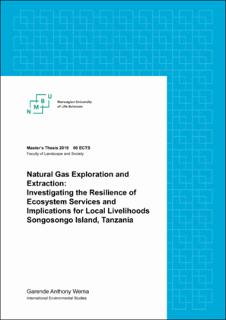| dc.contributor.advisor | Vedeld, Pål Olav | |
| dc.contributor.advisor | Virtanen, Anette | |
| dc.contributor.author | Wema, Garende Anthony | |
| dc.coverage.spatial | Tanzania, Songosongo Island | en_US |
| dc.date.accessioned | 2023-02-02T12:15:51Z | |
| dc.date.available | 2023-02-02T12:15:51Z | |
| dc.date.issued | 2019 | |
| dc.identifier.uri | https://hdl.handle.net/11250/3048001 | |
| dc.description.abstract | Natural gas has become increasingly important energy source in the world, and its significances are expected to increase in many years to come. This is because the demand of the product continues rising while new sources of supply being discovered in many parts of the world. The discovery of Natural gas in Tanzania in 1970s and its subsequent production in 2000s had sparked high development and economic expectations in various sectors of the Tanzanian economy. Both the government and local people from where the discovery was made had positive expectations that the resource will take them from one point of the development ladder to another with more improvements. However, the exploration and extractions of the petroleum products may create both beneficial and detrimental changes in the predominant people’s livelihood systems. Livelihood systems include the biodiversity and the environmental ecosystems that in most cases are harshly degraded with petroleum projects. This study examined the impacts of exploration and extraction of natural gas on Songosongo island Tanzania to livelihood systems. The principal objective was to examine how exploration and extraction of natural gas have impacted the livelihoods of people on the island. The livelihood activities on Songosongo island are gender differentiated as it is in many societies in Tanzania thus, the impacts to livelihood strategies cannot be generalized. The study revealed that while one gender category can be negatively impacted in some situations resulted from the gas project, it can be an opportunity and positive impacts to the opposite gender. Conceptual and theoretically the study drew heavily on concepts such as resilience and ecosystem service whereas the sustainable livelihood approach (SLA), was applied as a theory.
The study was conducted under qualitative paradigm thus qualitative research methods were employed in both data collection and analysis. The study sample included households performing diverse activities for a living such as fishing, seaweed farming, formal employment and casual labour in the gas plants and in government institutions like the Primary and Secondary schools, Dispensary and in executive government offices. The study findings illustrate that there are evident impacts of natural gas activities to livelihoods of local Songosongo community. The impacts are both positive and negative. In category the impacts are both beneficial and detrimental on social perspectives but viewed to be more detrimental on environmental side. The use of environmental resources on the island seemed to be unsustainable which is influenced by overpopulation resulted from an influx of new people coming to the island expecting to grasp good paying jobs at the gas plants which can uplift them in development. The study also revealed that overpopulation on the island is enhanced by an extremely high birth rate on the island. | en_US |
| dc.description.sponsorship | NORAD | en_US |
| dc.language.iso | eng | en_US |
| dc.publisher | Norwegian University of Life Sciences, Ås | en_US |
| dc.rights | Attribution-NonCommercial-NoDerivatives 4.0 Internasjonal | * |
| dc.rights.uri | http://creativecommons.org/licenses/by-nc-nd/4.0/deed.no | * |
| dc.subject | Natural gas extraction | en_US |
| dc.subject | Resilience | en_US |
| dc.title | Natural gas exploration and extraction : investigating the resilience of ecosystem services and implications for local livelihoods Songosongo Island, Tanzania | en_US |
| dc.type | Master thesis | en_US |
| dc.description.version | submittedVersion | en_US |
| dc.subject.nsi | VDP::Social science: 200 | en_US |
| dc.description.localcode | M-IES | en_US |

